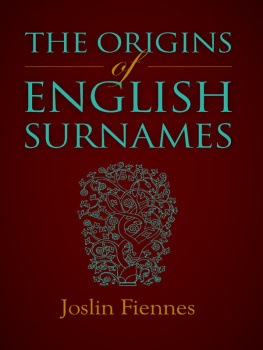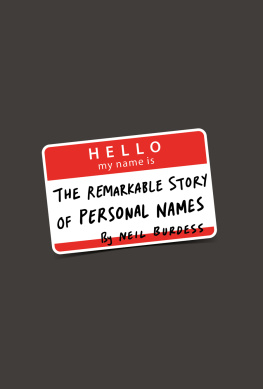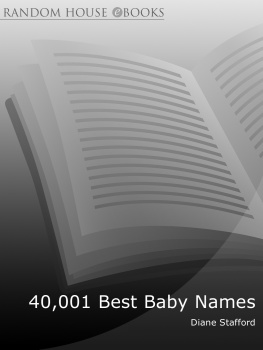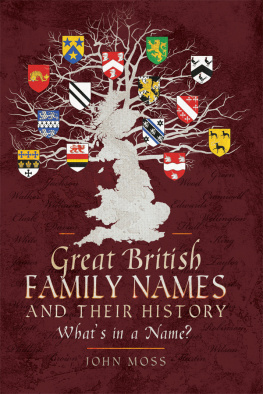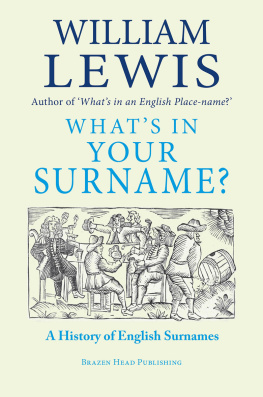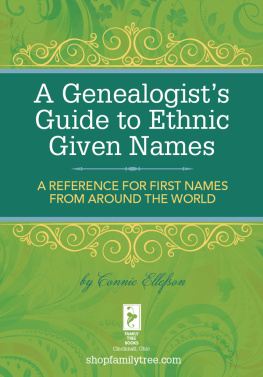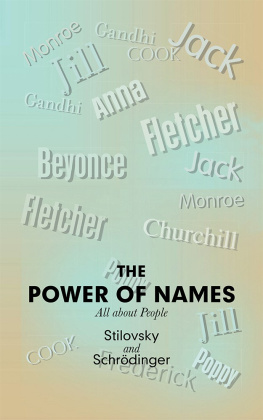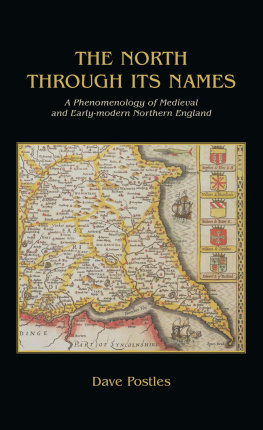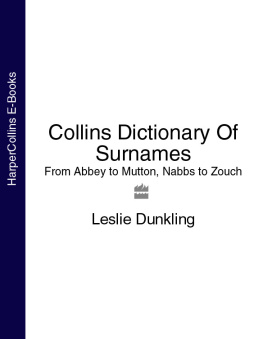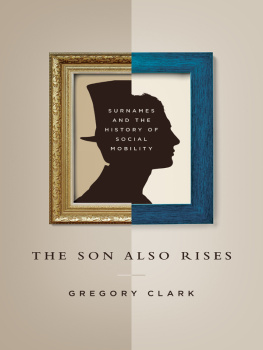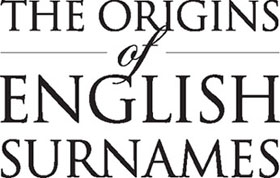
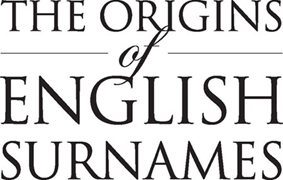
Joslin Fiennes

ROBERT HALE
First published in 2015 by
Robert Hale, an imprint of
The Crowood Press Ltd
Ramsbury, Marlborough
Wiltshire SN8 2HR
www.crowood.com
This e-book first published in 2017
This impression 2017
Joslin Fiennes 2015
All rights reserved. No part of this publication may be reproduced or transmitted in any form or by any means, electronic or mechanical, including photocopy, recording, or any information storage and retrieval system, without permission in writing from the publishers.
British Library Cataloguing-in-Publication Data
A catalogue record for this book is available from the British Library.
ISBN 978 0 71982 444 9
The right of Joslin Fiennes to be identified as the author of this work has been asserted by her in accordance with the Copyright, Designs and Patents Act 1988.
For Janet Hermans,
a much-loved friend
CONTENTS
INTRODUCTION
T HE WELL-KNOWN AND everyday, the small cogs that keep machines turning, are often taken for granted. Surnames belong to this group. We all have one. We use it all the time. If we pay attention to it, it is to find out about others with our name, like our ancestors. But look at the meanings and sources of surnames and take them together, and they turn out to be a rich record of a much broader subject society. Single names stand sentinel, but groups of names open the gates to the city.
It was in the retiring rooms of magistrates courts, while looking at the daily lists, that I first began to really look at surnames, wondering how Prettijohn came to be and how you could inherit Freer when friars were meant to be celibate. A great deal of time later, spent poring over dictionaries, medieval records and modern books and being bent like a hoop over the underside of a church choir seat, I discovered a new world.
It is a world that is unique. Most English surnames emerged over some 150 years before AD 1400. And each surname means something. These two facts were my starting-gun.
Their timing means that most describe a people who were largely illiterate. Surnames exploded into the records in the late fourteenth century, and document a unique history of ordinary medieval society during a short period of extraordinary social change. The roots of the names tell you the language people spoke then. It is a well-stirred mix of Old English, Middle English and Norman French, with some Norse and Celt, in which it is English that dominates. To see it in context, Norman French was the language of power and rank until Henry IV made English the tongue of kings at the end of the fourteenth century when most surnames already existed. But the vigour and wit, range and colour of the English mix of surnames show why the language had the capacity to win out in the end. These names were the final triumph of English over French and grounded the culture of England forever.
And their meanings led me into a lost society. They tell the story of the fading of English feudalism. Occupational names are about what people did; names describing the countryside and places in it tell where they travelled; nicknames record what people noticed, thought and laughed at; and those from first names document memories of earlier cultures. You see traditional life co-existing with great opportunity, some people on the land and at the manor, others moving into rural industry and urban crafts and trades. Some surnames record Norse still entrenched in the old Danelaw, but others show people travelling along trade routes across England and out over the Channel.
The deeper I looked, the more patterns I saw. Country names describe a feudal peasantry co-opted by fine titles; other groups record specialization and rural industry, fashion and luxury work showing mobility, growing prosperity and consumption. The same sea routes from the Mediterranean that brought in spices and damask via Weymouth, a small port on the south coast of England, were travelled by the Black Death. At the same time, you see attitudes, an obsession with appearances and rank, scorn for the elite (particularly the church), and a great deal of humour underlying the most innocent-looking of names. Names document memories of ancient myths and the heroes and gods within them. The easy way in which people turned to metaphors to describe their neighbours brought along symbols from a terrifying world view that had united Anglo-Saxon England with Scandinavia and northern Europe.
The language of surnames shows how the Norman invaders had infiltrated English society. English surnames often record traditional, small-scale and less skilled activities. The Normans brought a sophisticated hierarchy of management to feudal manors and estates, larger-scale merchants, higher-skilled crafts and suppliers of luxuries. But co-existing translations of many names show people confidently moving between the two.
This book is about English medieval names. It excludes names from later migrations, such as the Huguenots in the sixteenth century, and most Scottish and Irish names, especially those beginning with Mc or Mac. The majority of Scots and Irish with these names arrived in England in the eighteeenth century with names documented only from the fifteenth and sixteenth centuries that were, in any case, generally from a very different clan culture. But included are those names the Scots and the Irish were called in the Middle Ages: for the Scots this is often Scott, one of the more popular names; for the Irish it is Irish and Ireland. I also exclude Welsh surnames, established mostly in the sixteenth century, although, again, I do cover the names the Welsh were called in medieval England. Many modern Welsh names are from Norman personal names Roberts, Williams, Thomas but in medieval times most Welsh immigrants were known as Wallis or Walsh.
The sample of surnames taken from the telephone directory for South-East Devon for 20078 closely tracks the surnames used in an earlier study by C.M.M. Matthews from the London Directory, so it can be taken to be fairly representative of the population as a whole. Telephone directories still worked then as a source of English names because most people still had landlines, although with mobile phones, internet communication and ex-directory numbers, they are becoming less and less comprehensive.
Surnames have many facets; some will shine brighter than others for each of us. After all the insights surnames provide into the social and economic history and culture of ordinary medieval society, it is the vivacity, energy and imagination of the people behind the choices of these names that I most enjoy. There are those that tell of people like us: some descriptive, some mocking and some you cannot be completely sure of. There is Swift who might be slow, the Bramble who is painfully difficult, and the Toogood who may be just that. And there is always visual humour look at the Waghorns and Catchpoles, Benbows and Littlejohns. There are the Greeleys, whose skin is like wet snow after hail, and the Mackerells who have red scorched skin on their legs.
Listen to the names, and you get an ear for medieval cadences and an eye for their images. Ordinary medieval folk light a trail that leads to the King James Bible and Shakespeare through their directness, their imagery and their ability to communicate ideas and wit. Surnames allow us to track the real people in medieval society much further back than other records allow.
Next page
